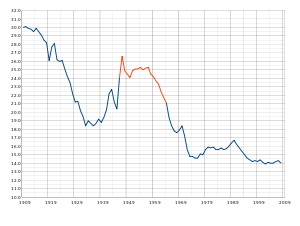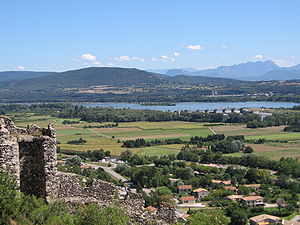Claude Forthomme's Blog, page 50
February 10, 2013
Italy like Argentina, Berlusconi like Evita Peròn?

There's a ghost stalking Europe and Italy: Evita Peròn. She is loved and reviled for what she has done to her country, Argentina. Whatever you think of her, she was the cause of Argentina's collapse - yet Argentina had been poised to become Latin America's most developed country after World War II, looking like the Latin-American version of Canada. Then Evita came along, and with her rabid, populist message, she managed to demolish everything and push Argentina in long decades of poverty and under-development.

Evita Peròn, second wife of Argentinian President Peròn - she died in 1952
Is Berlusconi another Evita? Will he do the same for Italy? Will he be the cause of Italy's collapse and exit from the restricted and hallowed club of the most developed countries of the European Union?
Most importantly: are the Italians really going to vote for their own Evita Berlusconi in spite of his dismal record?
We are two weeks from the elections and no one for now seems to recall that when he was prime minister (he was in power for some 15 years, from 1994), he has done nothing for them except look after his own interests and waste everybody's time as he fought Italian justice. He's been a terrible model for Italians, especially the young who at first fell in love with him, showing them the power of self-interest to the detriment of the society at large, throwing the whole country back to a dark Middle Ages where everyone looks after himself and damn the country!
Indeed, he has been the cause of Italy's dire and continuing economic problems, in particular the collapse in competitivity and the swelling of the national debt, yet most Italians seem to have forgiven him.
And most Italians seem to have already forgotten what Mario Monti's technical government did for them. How it restored Italy's image and credibility in the international community, an image that had been destroyed by Berlusconi's antics. And how Monti's "Salva Italia" decree extricated Italy from a threatening debt crisis that had downgraded the country to the role of a beggar obliged to pay excessive interest rates to international bond investors - at a cost of course to the average citizen forced to pay a property tax (the "IMU") on his home and accept labor law reforms. Now Berlusconi promises to abrogate the said tax and he has even had the incredible gall to promise to pay it back! The man is not afraid to lie, he has no sense of responsibility, no regard for his country's standing in the concert of nations. Small wonder he is the laughing stock of the international community.
The trouble is: people in Italy love him. They love to hear that they'll get their money back if they vote for him. Recent polls show that he can count on some 25% of the vote and that Monti is hovering around 11%. The center-left coalition led by PD Secretary Bersani remains the largest party but probably only by a few percentage points - and it is likely that to govern it will have to call in Monti. Meanwhile, Beppe Grillo's non-party is growing as people are disgusted by politics and his Cinque Stelle (Five Star Movement) could harness close to 20% of the vote.
The real danger is that Berlusconi could lose the deputy Chamber but win the Senate, and this would cause a total stall in government: no law would pass, the country would be paralyzed.
An Argentinian Evita result? It certainly looks that way...
Let me be clear: if Berlusconi wins and tries to redeem his promises to the Italian electorate, he will go counter to all the international agreements Italy has taken with the Central European Bank, the IMF and the European Union. He would set Italy on to its way out of the Euro and Europe.
Do the Italians really want an Italy-exit/Italexit? Do they realize that going back to the Lira, the whole Italian economy will grind to a halt, their savings will evaporate and their pensions drop to zero?

(photo credits: for Berlusconi: rogimmi; for Evita Peròn, www.calamuchitadigital.com.ar )
Related articles
 Italy's Berlusconi revives tax amnesty proposal(news.yahoo.com)
Italy's Berlusconi revives tax amnesty proposal(news.yahoo.com) Berlusconi's younger brother in Balotelli racism row(itv.com)
Berlusconi's younger brother in Balotelli racism row(itv.com) Berlusconi defends Mussolini for backing Hitler(foxnews.com)
Berlusconi defends Mussolini for backing Hitler(foxnews.com) Twin crises in Italy and Spain stalk markets as political unrest prevails(telegraph.co.uk)
Twin crises in Italy and Spain stalk markets as political unrest prevails(telegraph.co.uk)

Published on February 10, 2013 22:23
February 6, 2013
New Book Reveal (THE NEXT BIG THING BLOG HOP)
My next book? I’m going to surprise you: it won’t
be a boomer novel! I bet you thought I’d publish more Boomer lit stuff – you’ve
heard me talk about it so much these days, the hot new genre, bla bla, books that are written for the fast growing boomer market, transition to the Third Act in Life, my boomer book trailer for A Hook in the Sky etc. etc.
But no, at this
very moment, I’m into something totally different. Don’t count on me to stick to any given genre! After all, The Phoenix Heritage, my New Adult series, swerved from paranormal romance to techno thriller! Ok, I’ll get back to boomer lit at some point in
the future, I promise. It’s not something I want to give up, but not before a (long) detour in, guess what,
science fiction! And if you’re about to learn everything about my 180° swerve, it's
because I’ve been …tagged, or rather gently pulled into a game writers tend to
indulge in: “blog hops”. Writers, like everyone else, love to shop talk and
link with other author friends. Post and link, make a daisy chain of blogs! And
there’s nothing they like better than to talk about the book they're working on!
Before I do that, my thanks go to Jenny Gill for
tagging me! Jenny is a talented writer, author of 5 novels, the latest one “But
a Dream” just published in December 2012 - see her author page here And you
can check out her blog here where she tells you all about her next book, A Fairy
Tale for grown-ups (yes, she's a boomer lit author!)
Now, here are the 10 questions of the Blog Hop I
was asked to answer.
What is the working title of your book?
I WILL NOT LEAVE YOU BEHIND – actually that’s not going to be a novel, more
like a novella. And I’m toying with the idea of making it the first instalment
in a series entitled The One Percenter
Saga, and perhaps even publish it as a Kindle series…if Amazon agrees!
Series are now a new and upcoming way to read books: each instalment is longer
than a chapter but shorter than a novel so it’s easier for modern harassed
readers to find the time to read them, yet because they are linked one to
another, readers would want to get the next instalment. Sounds good? I like to
experiment with different formats…
Where did the idea for the book come from?
From the observation that ours is a society fixated
on looking young and staying young. Suppose that in a not too distant future,
medical advances would allow us to live to the last day in our lives looking
young and feeling fit. Imagine! Live all your life with a twenty-year old body,
then, when your time is up, you suddenly drop dead. Is that the perfect
solution to the pain of aging? Or would it cause new, different and unexpected problems?
What is the genre of the book?
Science fiction, of course. One might expect the
medical advances I’m talking about to take hold in about 100 to 200 years from
now. It’s an interesting exercise in imagination: visualize the future, a
future where current trends we notice around us now become exacerbated – in particular the trend towards
inequality, the One Percent against the 99 percent. The ultra rich against all
the rest. It would be a world full of conflict, envy and hate. Like now, but
probably only worse. Though some problems would be solved thanks to technology…That’s
what the One Percenter Saga would explore, one instalment after the next.
Which actors would you choose to play the
characters in a movie rendition?
More than a movie I see it as a TV series! I WILL
NOT LEAVE YOU BEHIND features two major characters: a beautiful woman (the One
Percenter) looking forever young and her lover who’s a ski champion (the 99
Percenter) and not aware of her true age.

Yes, you guessed it, Natalie Portman would be perfect in
the role of the woman and Daniel Craig as her lover! But there’s a minor
character named Alice, a sweet young Swiss woman, very sexy who becomes the main character in the
next installment.

Scarlett Johansson would be the right choice for her, my perfect Alice!
What is the one-sentence synopsis of your
book?
The year is 2213, medical advances have solved the
problem of aging, she is 122, he is 35, they look the same age, they are in
love but he doesn’t know her time is up, she’s got only 12 hours left to live…
Will your book be self-published or
represented by an agency/publisher?
I have to answer this one like Jenny: Self published but if any agents
or publishers out there are interested I’m open to offers!
How long did it take you to write the first
draft of the manuscript?
It started out as a
short story and was done in an afternoon! The expansion to novella-size, about
18,000 words, took another two weeks and quite a bit of research because some
of it takes place in a remote village in the Alps. But since this is a series,
I’m working on the next instalment and I expect it will take me at least a
whole year before I’m done with the series…if ever! It’s the sort of thing one
can keep going back…
What other books would you compare this story
to within your genre?
Think of the classics: Aldous
Huxley’s Brave New World. Or Kurt Vonnegut’s Player Piano where mechanization
has displaced the lower classes and assigned power and wealth to the world’s
engineers and managers. I see my One
Percenter Saga as a revised, updated version of that sort of book – looking at
our society with a critical eye and extending some visible social trends to
their very unsustainable extreme… Ok, I know, that’s pretty ambitious, but if
you want to write something good, you need to aim high!
Who or what inspired you to write this book?
Are you happy with the way things are?
Unemployment, poverty, wars and next to that, astounding wealth that shields a
tiny elite from what is happening to the rest of the world…Now you can write
about that as an economist – and I am an economist, a Columbia U. graduate – or
you can turn it into dystopian fiction. That’s what I want to do. You reach
more people that way than with (boring) (serious) non-fiction!
What else about your book might pique the
reader’s interest?
Erotic scenes?
Cold-blooded murder? Wild chases that will leave you breathless? Sure, it will
have all that. Our world, 200 years from now, is not going to be a cosy, quiet
sort of place. It will be exploding with violence and sex, it will be falling
apart as the One Percent tries to defend its privileges against the 99 percent.
You don’t believe our world is going in that direction? Well, I’m sorry, the
statistical evidence of growing inequality is against you! In the last forty
years, our world has moved in one direction only: more inequality…
Now, since this is a blog hop, it’s my
turn to tag someone else and I’m tagging two persons (the more, the merrier!). One is Emma Calin, inspired author of
Knockout, a passionate police procedural
(great fun) and punchy short stories, and now she’s just published Escape to Love, a perfect Valentine gift! Here’s her author page and her blog Can’t wait to find out what she is working
on!
The other is Tyler Roberts, a beekeeper
and organic gardener (I love organic food!), who’s just published his debut novel, an apocalyptic book
aptly called Truth’s Blood . God only knows what terrifying book he’s working on next! Check it out here in his blog.


Published on February 06, 2013 23:19
February 4, 2013
Boomers Coming of 2.0 Age

Whatever you think of boomers - they are dynamic and creative, no, they are full of themselves and arrogant - there are millions of them, some 77.5 million in America and they control 75% of American wealth. By next year, they will all be in their 50s and 60s. As it is, more than 10,000 boomers are reaching the age of 65 every day. And this is not counting those that live elsewhere in the developed world.
Time for them to seriously consider what to do next!
To think that boomers will go into retirement lying low and spending less is undoubtedly a mistake: they will spend at "boomer levels" says Matt Thornhill of the Boomer Project, one of the two authors of "Boomer Consumer," a book that examines marketing to the baby boomer generation (see article below in the Miami Herald). The other author is John Martin and they have both extensively researched and
studied boomers, uncovering key psychological, sociological,
and anthropological aspects of this generation. And they have identified
ten "new rules" for marketing to today's "Boomer Consumer" which will require a total recast of marketing strategies for an industry used to focusing its marketing efforts on18-49 years old adults.
Read more here: http://www.miamiherald.com/2012/12/24... article below in the Miami Heral
NBC Peacock Productions, in partnership with AARP and RLTV recently produced a one-hour long documentary exploring boomers' thoughts on their future. As one of them says, I'm 56, but I feel like I'm 18 with a 38 year experience! I love that, it's exactly the way I feel too!
Curious? Click here to see a preview on AARP.org. The documentary was first aired on RLTV on 31 January, but many more broadcasts are planned. Check the RLTV schedule for a time that suits you best. In addition, on Thursday, Feb. 7, you can watch the entire
documentary at 8 p.m. ET, followed at 9 p.m. by a "Rethink 50+ Town
Hall" discussion hosted by broadcast journalist Jane Pauley. Note: RLTV is available on Verizon FiOS, Comcast Cable, Bright House Networks, Time Warner Cable, and other cable distributors.
I stumbled on this while flipping through the AARP Bulletin I receive in Rome (printed on flimsy, low-cost paper - very environmentally-correct...).
This is the positive way to think about it. There's also, alas, a negative, albeit realistic way to think about it. According to the statistics reported in the ETF article (see below), there is a frightening "retirement crisis" looming up, with too many boomers
caught unprepared for retirement with insufficient savings. And that is actually a significant aspect of the on-going demise of the middle class, the slow collapse of the American dream...
But I don't want to leave you on such a sad note. I also came across this uplifting story reported by AARP editor and Pulitzer Prize winner, Jim Toedtman, recounting how his grandfather who had been a speech and drama professor at Otterbein College in Ohio had become the custodian at the college gym in 1950, once he had retired (he was 70). Armed with a mop and bucket, he worked at it for the next 15 years. The story gained national attention and when asked on CBS which job he found more rewarding, he had a wonderful answer, that I want to quote here in full:
" Every age in life has its own compensation, I'm still looking ahead. I don't want to die. There's too much fun in this world and a lot of good folks. A lot of them. And good books to read and fish to catch and pretty women to admire and good men to know. Why, life is a joy!"
As Toedtman writes, "he was ahead of his time". Indeed. He was a boomer ante-litteram! Yes, life is full of joy and good books to read: welcome, Boomer lit!
Related articles
 Jane Pauley to Host Baby Boomer TV Special(boomercafe.com)
Jane Pauley to Host Baby Boomer TV Special(boomercafe.com) 9 Apps Every Baby Boomer Should Know(mashable.com)
9 Apps Every Baby Boomer Should Know(mashable.com) 35 Shocking Statistics That Should Scare Any Baby Boomer?(etfdailynews.com)
35 Shocking Statistics That Should Scare Any Baby Boomer?(etfdailynews.com) Will retiring boomers be a drag on economy? Many say no(miamiherald.com)
Will retiring boomers be a drag on economy? Many say no(miamiherald.com)

Published on February 04, 2013 08:26
January 31, 2013
Three Tips for a Successfull Book Trailer
Every author, whether traditionally published or self-published, ought to know what makes for a successful book trailer. No author has the budget for a full blown movie trailer with actors and mind-blowing 3D scenes, so book trailers are the little brothers of movie trailers - but that doesn't mean they're not fun to watch! If the music is good and the visuals arresting, they will achieve the goal: attract attention, introduce readers to what your book is all about. Whether you pay someone to do it for you or even do it yourself (I know several authors who have thrown themselves into it), or whether your publisher has commissioned a book trailer for you, there are certain criteria you need to know to ensure that your book trailer is effective.
Here's one just done by a talented Polish film maker, Magda Olchawska, for my book, watch it and see whether it works:
Like it? It's really very simple - no actors, no special scenes, just music and images. It doesn't cost much to do (check it out here on Magda's website - less than two hundred dollars if you provide your own photos as I did since the paintings are my own).
That experience - it took me several months to figure out the kind of trailer I wanted and I did a lot of research around the Internet - has taught me a few things about book trailers and I wanted to share with you what I learned.
The starting point: what makes for an effective trailer? The reader! Yes, you've got to get his/her attention, and fast! You've got about 10 seconds to draw them in. And that means you need to know exactly who you are writing for. And you should NEVER bore them - keep them interested so they see your trailer to the end!
Tip # 1: Know your audience, pick the style to suit the taste of your (expected) readers. Are they Young Adults? Nature-lovers? Urbanites? Mature and experienced people, i.e. boomers like in the case of my boomer novel A Hook in the Sky? Look at book trailers in your genre and get a feel for the sort of trailer you need to produce.
Tip # 2: Look for an arresting opening. Something different that will draw your readers in. To achieve that, I did several things:
(a) pick a catchy tune, in this case the sort of music that a boomer might like...but much depends on what sort of book you wrote - if it's romantic, choose a moody, slow tune etc...
(b) play with an unusual image, in this case my book cover and turned it into a symbol of life: you climb one rung at a time...
(c) use a line that draws in your audience on a psychological level, something they might have experienced, that plays on feelings of empathy, here, the rungs of a ladder: we have often felt that life threw challenges at us, that it was hard climbing...
Tip # 2: Make it sweet and short. Some do 30 seconds trailers and that's a bit short to convey the story; others aim for 60 seconds and that's better. Ideally one minute and a half - but NEVER two minutes or more, that's far too long. Nobody on Internet is willing to waste that much time on you and your unknown book!
Tip # 3: Focus on the story. What's your book about? That's something you need to answer right away. Convey:
(a) the central point, the conflict raised, better still if you can link that to your book title...
(b) leave your audience wishing for more, wanting to find out how the story ends...
That's it, 3 simple tips!
But once you're done comes the hard part: distribution. Where are you going to show your book trailer? On your blog, on YouTube, on Facebook, Google+ , in short any Social Media you happen to frequent. I'm a member of the Goodreads Group discussing boomer lit and I put it there in the video section. And of course, don't forget to upload it on your Amazon Author page, see here, in the right hand column, there is a place for your videos.
You don't see it? Yes I know, it's hard to see! You have to scroll down the page and eventually something called "Author Video" turns up...But with the wrong image! Yes, it's that painting of the Niger girl that I did and which happens to be in the middle of the video. It's NOT the opening image (as it is here, above and on YouTube too). That's very unfortunate, because anyone looking at that video CANNOT LINK IT TO ANYONE OF MY BOOKS!!
I tried to change that image and couldn't. So I figured I'd load up my video on the Amazon.com book detail page for A Hook in the Sky, that was the obvious, logical place: it would help sales. I've seen that done on Amazon for other books, so why not for mine?
I looked everywhere for video upload instructions on the book page, nothing! Finally, in despair, I wrote Amazon, they very kindly replied within 24 hours: if I wanted a book trailer on my book detail page, I'd have to purchase their CreateSpace video package. You can check it out here : $1,199.00 for a 30 seconds book trailer (with text only), $2,199.00 for 60 seconds (with voice over).
What! But I had a book trailer already and I liked it the way it was! So I wrote back telling them that all I needed was to have my trailer uploaded to my book page and that I understood that this would require some time from their technicians and that I was willing to pay for the upload.
Someone from Amazon kindly got on the phone with me - think of that, all the way from the US to Rome where I live (I imagine he used Skype!). And I was told that no, no way could I pay for the upload separately. I had to go through their system and yes, of course, if I like my trailer so much, I could give them the line to follow and the images, I need not fear, they would do something very similar...But the cost! No, that was the cost, it couldn't be changed just for me.
Moral of the story: you can't get around them, it's their online retail site, not yours and they do with it what they please. So if you want a book trailer on your Amazon book page, lump it, stop complaining and do it with CreateSpace! Yes, I know, it will cost you...But Zon is the Master of his house!
Any suggestions? Have you ever done a book trailer and what's been your experience?
Related articles
 Thursdays with Amanda: The Rules for Book Trailers, Pitch Videos, and More(chipmacgregor.com)
Thursdays with Amanda: The Rules for Book Trailers, Pitch Videos, and More(chipmacgregor.com)
 The making of a book trailer(laurasmagicday.wordpress.com)
The making of a book trailer(laurasmagicday.wordpress.com)


Here's one just done by a talented Polish film maker, Magda Olchawska, for my book, watch it and see whether it works:
Like it? It's really very simple - no actors, no special scenes, just music and images. It doesn't cost much to do (check it out here on Magda's website - less than two hundred dollars if you provide your own photos as I did since the paintings are my own).
That experience - it took me several months to figure out the kind of trailer I wanted and I did a lot of research around the Internet - has taught me a few things about book trailers and I wanted to share with you what I learned.
The starting point: what makes for an effective trailer? The reader! Yes, you've got to get his/her attention, and fast! You've got about 10 seconds to draw them in. And that means you need to know exactly who you are writing for. And you should NEVER bore them - keep them interested so they see your trailer to the end!
Tip # 1: Know your audience, pick the style to suit the taste of your (expected) readers. Are they Young Adults? Nature-lovers? Urbanites? Mature and experienced people, i.e. boomers like in the case of my boomer novel A Hook in the Sky? Look at book trailers in your genre and get a feel for the sort of trailer you need to produce.
Tip # 2: Look for an arresting opening. Something different that will draw your readers in. To achieve that, I did several things:
(a) pick a catchy tune, in this case the sort of music that a boomer might like...but much depends on what sort of book you wrote - if it's romantic, choose a moody, slow tune etc...
(b) play with an unusual image, in this case my book cover and turned it into a symbol of life: you climb one rung at a time...
(c) use a line that draws in your audience on a psychological level, something they might have experienced, that plays on feelings of empathy, here, the rungs of a ladder: we have often felt that life threw challenges at us, that it was hard climbing...
Tip # 2: Make it sweet and short. Some do 30 seconds trailers and that's a bit short to convey the story; others aim for 60 seconds and that's better. Ideally one minute and a half - but NEVER two minutes or more, that's far too long. Nobody on Internet is willing to waste that much time on you and your unknown book!
Tip # 3: Focus on the story. What's your book about? That's something you need to answer right away. Convey:
(a) the central point, the conflict raised, better still if you can link that to your book title...
(b) leave your audience wishing for more, wanting to find out how the story ends...
That's it, 3 simple tips!
But once you're done comes the hard part: distribution. Where are you going to show your book trailer? On your blog, on YouTube, on Facebook, Google+ , in short any Social Media you happen to frequent. I'm a member of the Goodreads Group discussing boomer lit and I put it there in the video section. And of course, don't forget to upload it on your Amazon Author page, see here, in the right hand column, there is a place for your videos.
You don't see it? Yes I know, it's hard to see! You have to scroll down the page and eventually something called "Author Video" turns up...But with the wrong image! Yes, it's that painting of the Niger girl that I did and which happens to be in the middle of the video. It's NOT the opening image (as it is here, above and on YouTube too). That's very unfortunate, because anyone looking at that video CANNOT LINK IT TO ANYONE OF MY BOOKS!!
I tried to change that image and couldn't. So I figured I'd load up my video on the Amazon.com book detail page for A Hook in the Sky, that was the obvious, logical place: it would help sales. I've seen that done on Amazon for other books, so why not for mine?
I looked everywhere for video upload instructions on the book page, nothing! Finally, in despair, I wrote Amazon, they very kindly replied within 24 hours: if I wanted a book trailer on my book detail page, I'd have to purchase their CreateSpace video package. You can check it out here : $1,199.00 for a 30 seconds book trailer (with text only), $2,199.00 for 60 seconds (with voice over).
What! But I had a book trailer already and I liked it the way it was! So I wrote back telling them that all I needed was to have my trailer uploaded to my book page and that I understood that this would require some time from their technicians and that I was willing to pay for the upload.
Someone from Amazon kindly got on the phone with me - think of that, all the way from the US to Rome where I live (I imagine he used Skype!). And I was told that no, no way could I pay for the upload separately. I had to go through their system and yes, of course, if I like my trailer so much, I could give them the line to follow and the images, I need not fear, they would do something very similar...But the cost! No, that was the cost, it couldn't be changed just for me.
Moral of the story: you can't get around them, it's their online retail site, not yours and they do with it what they please. So if you want a book trailer on your Amazon book page, lump it, stop complaining and do it with CreateSpace! Yes, I know, it will cost you...But Zon is the Master of his house!
Any suggestions? Have you ever done a book trailer and what's been your experience?
Related articles
 Thursdays with Amanda: The Rules for Book Trailers, Pitch Videos, and More(chipmacgregor.com)
Thursdays with Amanda: The Rules for Book Trailers, Pitch Videos, and More(chipmacgregor.com) The making of a book trailer(laurasmagicday.wordpress.com)
The making of a book trailer(laurasmagicday.wordpress.com)

Published on January 31, 2013 11:06
January 28, 2013
Boomer Lit is Live on Facebook!

103 "Likes" in 24 hours from the moment of going live, something of a record!
Boomer literature, a genre born for boomers, is now on the Net: the Goodreads Group discussing Boomer Lit has just set up its own Facebook community page, take a look, click here. "Like" it, make comments, join the debate about boomer lit, share your views, tell your friends about it! This is the go-to page to get all the latest information about boomer lit, a hot new genre. The Goodreads Group grew to 200 members in the three months since its creation, now it got 103 likes on its Facebook page in just 24 hours, a record! (see screenshot above).
I can hear you yawn, oh no, not another page on Facebook!
Why bother, what's different about this page? Maybe you're not even a boomer (i.e. someone born between 1946 and 1964), so why should you care?
Well, I think you should care.
First, boomer literature raises inter-generational issues: as such, it's of interest to anyone, young or old. Now that you're an adult yourself, how do you get along with your Mom and Dad? Any problems with the elderly, those in their 70s and 80s and that so many of you boomers have to look after? What about long-standing marriages threatened by love affairs when, say, a beautiful young woman enters the life of a mature man?
Second, this Facebook page is not your usual author page peddling his/her books. Indeed, no direct pitches/self promotion is allowed on the site, the page has a ruthless administrator (me) ready to remove any post that doesn't have content!
Content is King!
What you will find here is news about boomer books and boomer films (after all, most movies are based on books). So you'll get the latest boomer book reviews, interviews with authors of boomer books and yes, along with boomer movie trailers, boomer book trailers .
Why, you may ask, include book trailers, aren't those "direct pitches"? Yes and no. The difference is that they are (usually) fun to watch, they can have a catchy tune, evocative images or even a short, enticing scene. In short, they are (generally) not boring.
Because that's the whole point of the page: to avoid boredom! The goal is to offer a fun way to learn about boomer lit. It's not literature for the decrepit and old. Boomer lit is tailored to the boomer generation: it reflects how boomers are approaching the third stage in their lives...with guts, with dynamism!
And they're doing that at a fast clip, 3.5 million/year in the US (where they are some 78 million boomers). Today, the youngest boomer (born in 1964) is 49, hopefully at the apex of his/her working life; the oldest is 67, i.e. probably already retired but, thanks to medical advances, still sprightly. They both share the boomer heritage: this is the generation that rebelled against the status quo, hoping to change the world...Remember Woodstock, the Flower People, Make Love Not War, 1968, self-regenerating trips to India? No other generation has so readily embraced ethical causes, from racial equality to the rights of women and gay people, the defense of the poor, of our environment and more.
This is the generation that invented Young Adult Literature, a major genre in the publishing industry. This is the generation that got the whole marketing industry fixated on selling to the young. Because of the boomers, Being Young was no longer equated to inexperience: Young is Beautiful! And of course it was a lucrative market: boomers in the US control about 75% of GNP - ditto in the rest of the developed world.
Well, boomers are no longer young. As a recent United Nations study
has shown, the whole world population is aging fast: by 2050, the
global population aged 60 and over is projected to triple to nearly 2
billion and developed countries will have more than their fair share of the elderly.
The world has gone on, wars have erupted, and boomers have learned that much as they wanted to, things rarely worked out the way they had planned. An older, scarred world awaits them. And now boomer are no longer young but they have experience, they are fully mature. They want to read books and see movies that reflect their current concerns, from novels that feature characters with whom they can identify to memoirs and guidebooks that can help them deal with "coming of old age".
Growing old is not sad. Growing old opens up new opportunities, new takes on life, above all, you gain a deeper understanding of the human condition. That's a heady plus.
Facebook is the biggest social network on earth linking a billion people who share what they do: time for boomer lit to takes its place in the world conversation. Whether you're a boomer or not, share your views!
Link to Facebook page: www.facebook.com/BoomerLit
"Like" the page, tell us what you think!
Related articles
 Activism: Baby Boomers have to re-think whistleblowing(over-50.typepad.com)
Activism: Baby Boomers have to re-think whistleblowing(over-50.typepad.com) The Jumping Times: We Baby Boomers got through whatever in very different ways(over-50.typepad.com)
The Jumping Times: We Baby Boomers got through whatever in very different ways(over-50.typepad.com) Tax Relief for Burdened Boomers(dailyfinance.com)
Tax Relief for Burdened Boomers(dailyfinance.com) Daily Baby Boomer News Update: January 26, 2013(babyboomers.com)
Daily Baby Boomer News Update: January 26, 2013(babyboomers.com) Daily Baby Boomer News Update: January 27, 2013(babyboomers.com)
Daily Baby Boomer News Update: January 27, 2013(babyboomers.com)

Published on January 28, 2013 01:46
January 24, 2013
Is the UK Headed for Exit from the European Union?

Cameron's discourse yesterday announcing that he will seek to renegotiate the European Treaties with a view to make them more "flexible" - read: in line with UK national interests - is something close to political blackmail. He claims he believes in Europe, but who can believe him?
I shall just post two lines here to indicate my own reaction as a European citizen committed to the creation of a European Union.
One, I'm horrified at the chauvinistic, nationalistic tone: he and his Conservative Party are straight out of the darkest pseudo-patriotic years of European History. This denial of European values is the kind of mentality that has caused the two World Wars. As long as Britannia Rules the Waves for the British, Europe has no chance.
A real throwback to a darker age.
The UK wants access to the lucrative European market (500 million people!) but will not give up anything in return to get access.
It's all take and no give.
This attitude is all the more remarkable that if the UK persists and a referendum is set up on the simple question, as Cameron put it, of an in/out option, and the British Euro-skeptics win - well, it will be Britain itself that will hurt the most, in particular the City...
Two, this seriously raises the question whether the UK has any right to stay in the EU. The experience so far with British membership has not been encouraging, to say the least. The UK has always acted as a break whenever there was a need to move forward.
Indeed, the UK's geopolitical allegiances are Atlantic, not European: the UK feels closer to the United States (same language, same culture) than to Germany or France even though they are next door neighbors. Undoubtedly the combined result of History and Geography: after all the UK is an island and it has a tendency to drift away from the continent...Historically, British diplomacy has always focused on pitting one European country against the other as a way to preserve its own freedom and integrity.
Moreover, at the practical level of the Brussels secretariat, the British are already disengaging themselves: an ever dwindling number of young Brits join the European bureaucracy, they just don't see it as a career for themselves. Politically too, the UK has operated on a downward spiral with its European partners and is no longer able to obtain important positions within the European Commission. At the moment, the highest position held by a Brit is Catherine Ashton's as the "High Representative of the Union for Foreign Affairs and Security Policy" - a mouthful to say that she should act as the EU's Foreign Affairs Minister...but in fact, she still doesn't. She is constantly relegated in the background. The last time we heard of her was when she made a statement on Gaza in November 2012...
Your opinion? Should the UK opt in or out? And if by chance it stays in, is there hope that it will be finally committed to building Europe?
Related articles
 PM: I want the European Union to be a success(itv.com)
PM: I want the European Union to be a success(itv.com) European leaders slam Cameron's EU comments(aljazeera.com)
European leaders slam Cameron's EU comments(aljazeera.com) Reaction to Cameron's EU speech: 'A politics of cherry-picking will not work'(guardian.co.uk)
Reaction to Cameron's EU speech: 'A politics of cherry-picking will not work'(guardian.co.uk) Guy Verhofstadt calls David Cameron 'a madman'. Britain should not have to listen to sneering Eurofederalists(blogs.telegraph.co.uk)
Guy Verhofstadt calls David Cameron 'a madman'. Britain should not have to listen to sneering Eurofederalists(blogs.telegraph.co.uk)

Published on January 24, 2013 02:37
January 21, 2013
Unemployment: When Will It Go Away?

Unemployment is a nightmare for everyone: Generation X that can't find a job in line with their studies and training, a nightmare for those baby boomers who have lost their mid-career job and can't find another one at all or one paying at the same level.
Unemployment can turn ugly, a battle between generations:
Recently I read a letter from a reader of the Italian magazine L'Espresso that was directed to journalist and author Stefania Rossini, one of the magazine's advice columnists, herself clearly a baby boomer. Signed Costanza Altobelli, the letter was bitter. Titled, "I am the daughter of an egocentric generation", she said she was 29, a Political Science graduate specialized in international relations, conversant in three languages, in principle destined to a good, perhaps even prestigious job in some international organization. Instead, here she was sitting at home, unwilling to work in a call center as so many of her friends did, while her parents ruminated that when they were young, life was nothing like that. You got a job easily, you never lost it, salaries increased every year.
She ended her letter with an unexpected jibe, asking the columnist whether she didn't feel any remorse - the implication being that baby boomers have helped destroy the job market, killing off opportunities for the young, that somehow they were responsible for the current mess. The answer from the columnist was equally surprising and strong: she told her that when she was young, "no presents were given" even then, and that she - and her whole generation - had to "fight for their rights". She suggested that if the young can't find jobs it's because they are no longer fighters, they don't go in for collective action, they each act in isolation from each other...
Really? So unemployment among the young would be caused by the young themselves, unwilling or unable to rise in arms? Come on! No amount of trade union action could solve the problem, and indeed trade unions (where they exist - and they do in Italy) are part of the problem: they defend the status quo, i.e. those who already have jobs. They certainly don't want to open the doors of the job market to outsiders, and especially not to the young...
Unemployment is sticky in a downturn:
There is no getting around that fact, and much of it is a direct result of our hard-to-budge labor institutions. It's sticky even in America that doesn't have the kind of trade unions you find in Europe. Economists say America is coming out of the Great Recession of 2008, yet jobs are not added at a sufficient rate to fill the gap left behind by the recession, much less to meet the new demand as the young enter the market. Indeed, there is an argument flying around the net that the real unemployment rate in the US is 23% rather than 7.8% - the official rate that doesn't take into account the long-term unemployed that has stopped looking for a job. Recently, the Federal Reserve of San Francisco has put out a paper that estimates that some 2 million Americans will start looking for a job again now that the economy is said to be out of the recession and that the unemployment rate is dropping. Which means that the said rate will stop dropping!
Things are no better on the other side of the Atlantic pond. In the UK, long-term unemployment simply won't go away. As analyst Spencer Thomson convincingly argues, "it is increasingly apparent the initial shock of recession and continued
stagnation in the economy has created a core of hard-to-reach
unemployed". Ditto for the continent where news of horrendous rates of unemployment among the young keep assailing us: according to the Eurostat latest data (November 2012), the rate was 23.7 % in the EU-27, with the lowest rates observed in Germany
(8.1 %), Austria (9.0 %) and the Netherlands (9.7 %), and the highest
in Greece (57.6 %) and Spain (56.5 %).
There is a problem however with the way this data is calculated: the rates apply to youth between the age of 15 and 24 when many are still studying. Therefore the real problems in job-finding that young graduates face is not caught at all by the statistics. Yet Eurostat tries to sound reassuring: they tell us "Educational qualifications are still the best insurance against
unemployment, which clearly increases the lower the level of education
attained. This characteristic was noted in all Member States except for
Greece and Cyprus in 2011, as the average unemployment rate in the EU-27
for those having attained at most a lower secondary education
was 16.7 %, much higher than the rate of unemployment for those that had
obtained a tertiary education qualification (5.6 %)."
Reassured? Personally, I'm not. We all know from experience and watching the difficulties of young graduates around us, that they do face serious difficulties. The round of job interviews has grown long and painful. By contrast, I remember being given a job after a single interview back in the 1970s. Now several interviews are the norm.
A whole class of job specialists has arisen - the so-called "head hunters" to assist in job finding - that hardly existed forty years ago. Back then, executive recruitment agencies were focused solely on finding candidates to fill key executive positions, now they are used to land first jobs and medium-level management positions. As noted by the Association of Executive Search Consultants in an article prepared on the occasion of its own 50th Anniversary, executive search which started as a by-product of management consulting just after World War II, has since grown into a global consulting industry with annual revenues of over $10 billion.
Ten billion US dollars!
Small wonder that some social media, in particular LinkedIn, has grown in part thanks to its ability to foster connections between employers and people looking for jobs. No question about it, the statistics may not show the extent of the unemployment problem and how it really affects both the educated young and old - yes, because if you're over 50 and you've lost your middle-level management job or your specialist post, your chances of landing another similar job are excruciatingly small, perhaps even worse than for a graduate fresh out of school.
What is worse is that these awful levels of long-term or "hard-core" unemployment have been around for quite a while now and have started long before the 2008 recession. Job growth in America has been unusually weak from 2001 to 2007 even though these were boom years: job creation simply failed to keep pace with population growth. The simple fact of the matter is this: the country has not developed any major new industries that employ large and growing numbers of workers. In the past, major innovations pulled the country out of the doldrums: the railroads in the1870s, the auto industry in the 1920s and more recently, the Internet sector in the 1990s. Now, there's nothing like it on the horizon. Indeed, high unemployment is beginning to look quite like the norm!
Why is unemployment so sticky?
Yet most economists still cling to the idea that unemployment is cyclical. Give a boost to the economy, kick start investment, get consumer demand going and economic growth will absorb the slack. Sure, growth would help, but it is illusory to believe that it will be enough to solve it. Unemployment reflects a secular crisis. A famous piece of academic research by Carmen M. Reinhart and Kenneth S. Rogoff has demonstrated that a financial crisis (like in 2008) typically leads to a decade of high unemployment.
This means that, at best, unemployment won't get better before circa 2018. I would argue that is could even take longer because unemployment has become largely structural and here is why.
(1) increasingly specialized skills are required to find a job in the modern, technologically-driven economy. Even though the media often reports on jobless graduates (the overqualified bartender makes good copy), the evidence is in: graduates still land jobs more easily than non-graduates and ten years later they are found to have higher incomes. This does not detract from the fact that those who do not have the skills will find themselves out of the ball game unless somebody (the government, producers' associations) finance their training/re-cycling. So the answer to this particular conundrum requires time and money. And the willingness on the part of the individual to go back to school.
(2) technological innovation is a double-edged sword: the theory is that America is particularly strong and likely to give rise to the "next great industry" because it has (a) the world’s best venture-capital network, (b) a
well-established rule of law, (c) a culture that celebrates risk taking and as a consequence (d) an
unmatched appeal to immigrants, particularly those who are well-trained "big brains". Fine and good. But for the moment, we are in the midst of a maturing IT revolution - really not a revolution anymore - and no one sees where the next great industry might be coming from. In the past, technological progress, in creating jobs in new sectors,
moved the economy from agriculture to manufacturing to services. There
were lags and hard times, there was unemployment but eventually a new
equilibrium was achieved. That model is kaput. The economy has become globalized and we are witnessing the double-edged sword of the digital technology at work: jobs to produce computers and other IT devices have been exported abroad, mostly in Asia (China, Taiwan, Korea); the Internet and computers replace physical workers, suppressing jobs in factories, typing pools, travel agencies etc. i.e. in both manufacturing and the services industries. Job creation structurally lags behind job demand and that is not a situation that is likely to change anytime soon.
(3) consumer demand is at risk: it used to be sustained by middle classes rising incomes and jobs, but no more. This is an increasingly unequal society and the move away from equality started some 30 years ago. The data is in: the 2008 recession has further cemented income inequality and I won't bore you with the numbers (if interested, click here). The ultra-rich is getting richer, the middle class is disappearing, or rather, it finds itself squeezed (see above two points). Therefore demand for consumer goods may be unstable or weak and in any case is likely to rise at a slower pace than in the past. The one percent, no matter how profligate, cannot make up for the shortfall in demand from the 99 percent, in particular the middle classes. This long-term trend linked to rising inequality was successfully countered in the 2001-2007 period when consumer demand was doped with easy credit (particularly home mortgages). But we have seen with what results when the subprime mortgage crisis hit in 2008!
(4) the financial world is increasingly syphoning out savings from the real economy: this is hard to prove but there is evidence that private equity firms, hedge funds, even family investment offices all increasingly pursue financial investments that are further and further removed from the real economy. In simple terms: investors prefer to put their money in derivatives rather than loans to businesses. Even venture capitalists have become risk-adverse and more demanding before investing in a start-up. Wall Street has turned into a gambling casino and the divide with Main Street has grown into a chasm. Central banks, notably the Federal Reserve and the European Central Bank have moved in with quantitative easing measures to try and encourage banks to return to their primary role as business lenders. Whether this will work in the long run remains to be seen.
Solutions? Based on the above analysis, it is clear that any solution must address:
(1) training: upgrade skills, recycle/refresh so that people develop a profile of skills adapted to the available jobs
(2) job creation: putting up walls against globalization is politically tempting but it can easily backfire as other countries adopt retaliatory measures. In short, it's not as effective as actual job creation . The latter however requires a broad range of support measures from the government, ranging from training (see point above) to fiscal incentives and labor policy changes to support start-ups and innovative investments, especially in promising new areas like clean energy
(3) Returning banks to their role of business lender: this is very important because the government can't do everything and shouldn't. The private sector must fill its role in the economy, particulary as the main investment agent. In practice, this means the banks should quit playing with derivatives and return to their primary role of lending to businesses.
(4) strengthening consumer demand: we know now that doping it with easy credit is not a viable solution. Austerity measures in times of recession further kills consumer demand as it suppresses government jobs. In fact, any policy choice that excludes the government from the real economy will make overall demand weaker than it need be. This said, in the face of rising income inequality, it is difficult to see how to solve this problem.
There is however another possibility: demand from the BRICS countries is increasing, new middle classes are on the rise in China, India, Brazil etc. But of course, those countries are also in the hands of the ultra-rich...A vicious circle!
Any suggestions welcome...
Related articles
 Unemployment at 23%, Not 7.8%(conservativeread.com)
Unemployment at 23%, Not 7.8%(conservativeread.com) Why the unemployment rate might soon stop falling(washingtonpost.com)
Why the unemployment rate might soon stop falling(washingtonpost.com) The Unemployed and the Unaccounted For(stuck-on-wealth.com)
The Unemployed and the Unaccounted For(stuck-on-wealth.com) Long-term unemployment: The national emergency that refuses to go away(leftfootforward.org)
Long-term unemployment: The national emergency that refuses to go away(leftfootforward.org)

Published on January 21, 2013 01:19
January 15, 2013
More About Baby Boomer Books and Why it's a Fast Growing Genre

Boomer literature is spreading on the Net, and following in the footsteps of the Passive Voice, I'll pick up the more important blog posts as they come up. Here is one (just published on January 14, 2013) from Abigail Padgett, author of two acclaimed series of mysteries and one stand alone Baby Boomer novel, Bone Blind . Here it is:
Baby Boomer Books
Oh joy, a
controversy! 78 million people now comprise, and millions more are close
to, a demographic category several million others wish would just shut
up. The 78 million-plus are Baby Boomers. Late forties and
up. The third stage of life. Some Boomers are insisting that
third-stage experience will give rise to its own literary genre, while
detractors are certain that nothing interesting can possibly happen after 46
and thus no literature can emerge from the Boomer demographic. Stories,
after all, require conflict, drama, interesting stuff about which to
write. Hmmm.
All
literature is about change, about transition. A king dies, conflict
ensues, new king happens. Boy meets girl, conflict ensues, both are
changed (usually into parents). Aliens/serial killers/heartless
corporations threaten, conflict ensues, salvation lies in characters who change under
threat in order to slay the beasts. Transition, which cannot occur
without conflict, is the cornerstone of stories.
Life
involves four major transitions, two of which (birth and death) do not produce
literature. They are silent, since we cannot remember our births and
cannot write books while dead. The second transition, child-to-adult
(innocence to experience), has given us countless myths and the currently
wildly popular YA genre.
Claude
Nougat, a Rome-based novelist and economist, notes that sheer Boomer numbers
created YA forty or fifty years ago. Those same numbers, now mature, are
creating a new genre reflecting the third transition – adult-to-sage
(experience to wisdom). But is the third transition sufficiently rife
with conflict and drama to make literature?
...
Boomer
Lit is about making it, about defining that shadowy divide and crossing it with
style. Boomers are beginning to write and read books about themselves in
every genre, although Hollywood, ever sensitive to sources of impressive
profit, got there first. The Descendants(George Clooney), The
Best Exotic Marigold Hotel (Maggie Smith, Judi Dench) and Hope
Springs (Meryl Streep, Tommy Lee Jones), to name only three of about
fifteen in 2012, are box-office hits. Many more Boomer movies are in the
pipeline, Boomerism is a hot topic in the media and there are too many Boomer
blogs to count. But Boomer Literature is the turtle in this race, scrambling to
catch up.
Why? Not because young people think older people are
hopelessly stupid and out of it; that’s perfectly normal. Every
generation must define itself in opposition to what has (recently) gone
before. The life-threatening leap to wisdom from the precipice of
experience cannot interest those still trying to accumulate experience.
The attitudes of the young are of no significance here, and cannot be blamed
for the dearth of good Boomer literature.
To find out the answer, go to Abigail Padgett’s blog: http://abigailpadgett.wordpress.com/
Yes, boomer lit is no longer a turtle...and given the size of the boomer wave, you can expect boomer lit to go mainstream, but speaking of boomers' transition to the third act in their lives, it might be more painful than expected as a result of the 2008 recession. Look at the article below reporting on recent findings by the American Writers and Artists Inc.: unemployment in the 50+ category has skyrocketed, many have to find money to supplement their income and for boomer writers copywriting could be a solution (for more on this, click here).
Warning: copywriting is not for everyone, you have to write promotional advertising material in such a way that the reader is convinced to take action and buy. And if you are an author, it is clear that copywriting takes away from your writing time. On the other hand, if you decide to self-publish, the experience of being a successful copywriter could come in handy in your own book promotion efforts.
One thing is certain: this long recession, and the pain it inflicts not only on the young but also on boomers who are stuck in long periods of unemployment should be the subject of thoughtful novels raising the issue or perhaps funny ones, turning a painful theme into a moment of entertainment. So far, it doesn't look like that theme has been picked up, though it has in the movies - but not in baby boomer books that I know of...But I could be wrong on that. If you know of any, please tell us about it in the comments.

US birth rates from 1909 to 2008 - the red segment is known as the Baby Boomer period
Related articles
 What's Next Summit to Reveal How Boomer Entrepreneurship is Driving America's Post-Recession Economy(prweb.com)
What's Next Summit to Reveal How Boomer Entrepreneurship is Driving America's Post-Recession Economy(prweb.com) Baby Boomers Celebrate Birthdays(pairentsdaily.wordpress.com)
Baby Boomers Celebrate Birthdays(pairentsdaily.wordpress.com) American Writers & Artists Inc. Reveals Lucrative New Online Careers for Unemployed and Underemployed Baby Boomers(prweb.com)
American Writers & Artists Inc. Reveals Lucrative New Online Careers for Unemployed and Underemployed Baby Boomers(prweb.com)

Published on January 15, 2013 06:15
January 7, 2013
Boomer Literature: What it is and Why it's Growing

Boomer Literature, or baby boomer novels, are suddenly the talk of the town. Starting in December 2012,
the blogosphere picked up the story, and the birth of boomer literature was
being discussed and widely commented on many heavily trafficked websites, including Boomer Café,
The Passive Voice, The Kindle Nation Daily, Digital Book Today, Indies Unlimited, Venture Galleries, Gawker Media.
You'd think the publishing industry would be the first to take note that a new genre was burgeoning, yet that is not the way it happened: Hollywood preceded publishing. Perhaps that's the nature of the beast: Hollywood has access to a much larger public (people who view films) than the publishing industry (people who read). Therefore, new trends in the general public, new tastes, new interests emerge first at the level of movies, before they are reflected in book sales.
In any case, film directors were the first to take the plunge and aim movies at a silver-haired audience, taking, as is often the case, a novel as a starting point. Louis Begley's About Schmidt inspired a
hilarious film made in 2002 starring an unforgettable Jack Nicholson. Although the film is rather far away from the book, there is little doubt that its success marked an early turning point.
Suddenly retirees were fun, even sexy. Stories about them, about the third act in our lives, had found a market.

Judi Dench in Berlin (Wikipedia photo)
Similar films followed exploiting the same marketing vein, some humorous and suspenseful like RED (i.e. Retired Extremely Dangerous),
others more emotional and historical like The King's Speech, but all
sharing a focus on challenges facing the over-50 generation.
2012 was a special year, first with a wonderful film that came out of England, based on Deborah Moggach's book These Foolish
Things . Renamed The Best Exotic Marigold Hotel, it was an instant
success, featuring Maggie Smith and Judi Dench as part of a bunch of British retiree on a romp in India. A sequel is presently in the works. Then the trend was taken one step further: Austrian director Michael Haneke's film Amour with Trintignant and Emmanuelle Riva hit the screens winning the Palme d'Or at the Cannes Festival and garnering praise in America where it is widely expected to win an Oscar for best foreign film. While it features a somber story about a couple of music teachers in their 80s (the wife is dying), it does signal a major change in the tastes of the public. Also,what is noteworthy is that the film features much older people than boomers. Indeed the boomer here is the couple's daughter, beautifully played by Isabelle Huppert.
If you haven't seen Amour yet, judge for yourself, here's the movie trailer:
This kind of film suggests that new posibilities are
opening up for boomer literature: it is likely to encompass not only what
happens to boomers themselves but it will also concern their relationships both with
younger and older people. Also the themes will be much darker - there are some excellent books out there that do not hesitate to focus on somber content, notably Stephen Woodfin's The Warrior with Alheimer's and Betsy Robinson's Conversations with Mom: An Aging Baby Boomer, in Need of an Elder, Writes to Her Dead Mother.
Since films are generally
made from books, it began to dawn on some people (including myself) that a new genre aimed at more mature people might be in the making.
How to define this new genre? Surely not literature for the aged and the decrepit! A more neutral term was needed, one that would however describe what was happening. That's how Baby Boomer novels, BB novels or boomer literature was born!
It all started with a simple observation. There is at present in the
publishing industry only one widely recognized, historic audience-centric genre: Young Adult
literature (or YA lit, defined as aimed at the 14-18 age group). Since 2009, a new audience-centric genre was added: New Adult similar to YA, but focused on somewhat older adults on the theory that maturity is only really achieved when people are in their twenties. Both YA and NA are focused on coming of age issues.
All the other genres the industry has devised to assist readers in book discovery are content or theme-related: romance, sci-fi, historicals, thrillers, paranormal etc. And this is why YA spans across a broad range of theme-related genres and sub-genres (you have paranormal YA, dystopian YA etc). The success of YA
which rose as a major category in the 1960s and 1970s was clearly due to the wave
of boomers leaving their adolescence behind and providing a huge market for
stories centered on the challenges of entering adulthood.
Now that boomers are getting
older and hitting retirement age - at the rate of some 3.5 million every year -
they are interested in stories relevant to them at this stage in their
life. Thus the new boomer lit genre could be defined as addressing "coming of old age". Boomers, who in
their young years were rebellious and keen to change to world of their parents,
still see themselves as an active, dynamic lot. They are convinced that their
third slice of life, made longer (and often better) by medical advances,
is a chance for them to do amazing things, even start a second career. And it is certainly a moment when people ask themselves existential questions again: now that my work is behind me, who am I? What can I do in my remaining years?
Books, to stay relevant, need to accompany these changes in their lives,
meeting the new demands and needs, putting forth characters boomers can identify
with, characters who face those existential questions.
Hence the term boomer
literature or Baby Boomer novels (BB novels), a neutral term that eschews the
negative connotations of words like "aged", "aging" or
"silver-haired audience".
Why is boomer lit going to be big? Simply because the market for boomer literature is potentially
very large: by a strict definition of boomers (those born between 1946 and
1964), in 2012 there were close to 78 million such people in the US and (though certainly not all of them are rich!) they control some three quarters of GNP. The youngest boomer is 49, the
oldest is 66. Yet as a genre, these age limitations should not be taken too literally. Give or take a few years, what matters is that the books address issues of concern to people in the over-50 generation. And while the data is only for the US, it is obvious that the genre is of interest to all people over-50 no matter
where they live. And a matter of curiosity to many younger people, those who wonder where their lives will end up.
One can expect boomer literature to grow rapidly for the same reasons that made YA lit the success it is. History will repeat itself: once
again, boomers are behind it. In that sense, boomer literature or BB lit is a
real pendant to YA across time - it just happens to be on the other side of
maturity. But the similarities don’t stop there. Like YA lit, it is a vast and
flexible genre that can accommodate all kinds of sub-genres, from light comedy
to tragedy, from romance to thrillers and more. Beyond novels and graphic
novels, it also covers poetry, short stories and non fiction, memoirs, guidebooks...And like YA, boomer lit is likely to attract the interest of younger people, both as readers and writers (there are already some younger writers who have produced BB novels, like Beate Boeker and Sofia Essen).
In the fall of 2012, a number of writers became interested in the new genre. In September, a thread was created in the Amazon Kindle Fora for
authors to list their BB novels and it immediately began to grow. In November,
on Goodreads, the largest online reading club in the world, a group was created to discuss BB novels. By year-end, with a contantly expanding membership (now over 150 members), the
group has some 50 titles on its bookshelf, including many from NYT bestselling
authors. Every month, the Group reads a new BB novel (democratically selected
through a poll) as a hands-on practical way to explore the confines of boomer
literature (it is currently reading A Hook in the Sky).
A definition has already been put forward by two writers, Stephen Woodfin and Caleb Pirtle on the Venture Galleries site: “Boomer books reflect fundamental human issues and can be
any genre, but they are character-driven stories centered around those
who have the experience to understand life: its trials, its
tribulations, its triumphs, and its contradictions.”
What do you think of that definition? Do you agree with it? I note it is somewhat broader than my own definition of it as a genre centered on "coming of old age" (a touch of irony is included!). Your ideas?


Published on January 07, 2013 01:51
December 29, 2012
Did You Have Nougat for Christmas? Secrets of An Old-fashioned Sweet

Montelimar's claim to fame: Nougat. But was it really born there? (Photo credit: Wikipedia)
Did you have nougat for Christmas? If you have, you've renewed with an old tradition that is widespread in Europe. You've treated yourself to a moment of joy in a world that, as the year 2012 comes to an end, is increasingly sorrowful, with reports of people in Mali getting their hands cut off for alleged thieving or stoned to death for adultery, a young woman in Delhi dying after having been raped on a public bus and horrendously massacred with a metal rod, of Afghan policemen killed in their sleep by their turncoat colleagues who then run to the Talibans for safety...
Which is why I wanted to tell you about something pleasant that helps to reconcile oneself with human nature, a simple, magical sweet made from honey, roasted nuts and whipped egg white. Called nougat in most northern European countries, Russia included, it goes by many more names in Southern Europe: turròn in Spain, turrò in Catalan and torrone in Italy, all three terms referring to the toasting of the nuts it contains. In Sicily, the best variety is called cubbaita from the Latin cupedia. In Malta, it's qubbadj (close to the Sicilian term), in Greece, it's mandolato (a reference to almonds). And it even exists outside of Europe: called Gaz in Persia, it's been produced for centuries in Esfahan and Boldaji located in the central plateau of Iran. But it's also been made in Iraq where it's known under another name: Mann al-Sama. However Gaz is different in one fundamental way: it uses the sap from a local plant, a species of Tamarix that is not found in European nougat.

Benevento: Teatro Romano (Photo credit: rossamente)
There is little doubt that nougat as we know it was born somewhere in the South of Europe and everyone tried to lay claim to it. Chances are however that it originated in Roman times, a sweet the Latins called cupedia, a term meaning delicacies or fondness for delicacies - the perfect way to call a sweet!
For centuries, it was made across the Italian peninsula, from Sicily to Benevento to Lombardy. The nougat destined to become the most popular variety in modern times first appeared in Cremona in the early 15th
century: this is the one you've probably had, it is white, a concoction of honey and beaten egg whites.
Brown nougat appeared later and is called mandorlato in Italy and nougatine in France. The difference? It doesn't contain egg whites. After those two come all the other varieties: with chocolate, hazelnut, candied fruit - whatever. No doubt, all very good but further and further away from traditional nougat. In Australia and the US, nougat can even become an ingredient in other types of candies.
The French, not unsurprisingly, claim that nougat originated in the ancient Provence city of Montélimar that predates Roman times, and that this is the real "capital of nougat". It certainly was a big production center starting in the 18th century but nowadays Montélimar, a pretty sleepy town off the Rhone river, finds itself by-passed by a new highway (the A 7 Autoroute). Tourists no longer come as they used to and many nougat factories have closed down...

View Rhone river near Montelimar, Franchttp://en.wikipedia.org/wiki/Nougate (Photo credit: Wikipedia)
Still, what Montélimar did manage to achieve is pass on the term "nougat" to the rest of Europe: the word comes from old Occitan pan nogat (in Latin: nux gatum) which means nut bread.
But the habit to eat it for Christmas, was that also a French tradition? The French love to make you believe that anything that has to do with food comes from them. But in this case, it's highly unlikely. The link between a sweet originally made in Italy and the Christian festive occasion seems to have a completely different origin: the Bourbon Kings of Naples and Two-Sicilies were the ones to promote nougat. It seems there were several centers of excellence in Benevento (a region under the King's purview) for example Santa Croce del Sannio and Montefalcone di Val Fortore. The "cupeta beneventana" (again that reference to Latin cupedia!) was so famous that it was sent to Rome and given to prelates as a special holiday present, earning the name "torrone del Papa" (the Pope's nougat). Soon enough - by the 1800s - the habit of eating nougat at Christmas spread across Europe.
Which kind of nougat do you like best? It comes in all sorts: soft and gooey, hard and crunchy, with different kinds of nuts, all white or covered with chocolate...Our modern food industry in the US and UK has taken the nougat recipe to another level, adding sucrose and corn syrup to it and throwing it into all sorts of sweets and candies, creating with marketing inventiveness new candy bars, from Mars to Milky Way and many more.
Nougat is versatile, is everywhere and makes you happy... one reason why I picked it as a pen name. There's another, more personal reason too but I won't bother you with it for now (If you're curious, you can find it
Have a fruitful, nougat-full, prosperous 2013!
[image error]
Nougat sold in Perth, Australia. (Photo credit: Wikipedia)


Published on December 29, 2012 03:29



